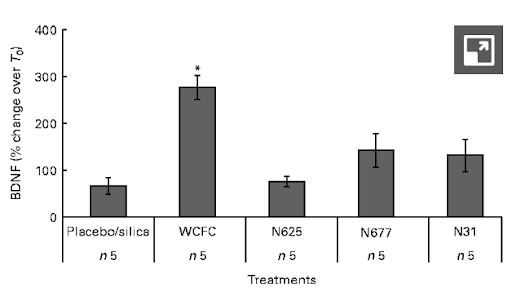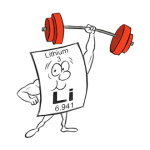Coffee Fruit And Memory
 Coffee fruit is believed to provide great benefits for the brain. Studies show it could significantly boost BDNF within 2 hours. BDNF is an important protein that promotes the survival, function, and development of neurons. Lower levels of BDNF are often associated with memory loss and cognitive decline.
Coffee fruit is believed to provide great benefits for the brain. Studies show it could significantly boost BDNF within 2 hours. BDNF is an important protein that promotes the survival, function, and development of neurons. Lower levels of BDNF are often associated with memory loss and cognitive decline.
Coffee Fruit Showed Positive Effects On Memory.
A 2020 study included 71 older adults with mild memory loss. Those taking coffee fruit were compared to those taking placebo over 28 days through cognitive evaluations and memory testing (1).
This study found measurable effects of coffee fruit beginning in the first week and persisting throughout the 28-day study. Those receiving coffee fruit experienced significant decreases in reaction time testing. Positive trends were also seen in memory testing (1).
Coffee Fruit Boosted BDNF By 143% Within Two Hours.
One single 100 mg serving of coffee fruit was shown to increase levels of brain-derived neurotrophic factor (BDNF) in participants by 143% within two hours.
This study also tested green coffee bean extract, grapefruit seed extract, caffeine and placebo, all of which failed to significantly increase BDNF levels.
Researchers believe the coffee fruit’s effects on BDNF may be due to its unique polyphenol profile (2).
BDNF plays a prominent role in cognition and memory. It is a neurotrophin which is a kind of protein that promotes the survival, function and development of neurons (3). Memory loss is often associated with lower BDNF.
One study showed that by having BDNF levels higher by one standard deviation, the risk for developing memory loss or impairment was lowered by 33% (4).
Aquilegy Uses The Best.
Aquilegy uses “CognatIQ” patented coffee fruit extract which is decaffeinated and the same form used in studies showing positive effects on BDNF.

(Reyes-Izquierdo, T., Nemzer, B., Shu, C., Huynh, L., Argumedo, R., Keller, R., & Pietrzkowski, Z. (2013). Modulatory effect of coffee fruit extract on plasma levels of brain-derived neurotrophic factor in healthy subjects. British Journal of Nutrition, 110(3), 420–425. https://doi.org/10.1017/s0007114512005338)

1) Robinson, J. L., Hunter, J. M., Reyes-Izquierdo, T., Argumedo, R., Brizuela-Bastien, J., Keller, R., & Pietrzkowski, Z. J. (2019). Cognitive short- and long-term effects of coffee cherry extract in older adults with mild cognitive decline. Aging, Neuropsychology, and Cognition, 27(6), 918–934. https://doi.org/10.1080/13825585.2019.1702622
2) Reyes-Izquierdo, T., Nemzer, B., Shu, C., Huynh, L., Argumedo, R., Keller, R., & Pietrzkowski, Z. (2013). Modulatory effect of coffee fruit extract on plasma levels of brain-derived neurotrophic factor in healthy subjects. British Journal of Nutrition, 110(3), 420–425. https://doi.org/10.1017/s0007114512005338
3) Ng, T., Ho, C., Tam, W., Kua, E., & Ho, R. (2019). Decreased serum brain-derived neurotrophic factor (BDNF) levels in patients with alzheimer’s disease (AD): A systematic review and meta-analysis. International Journal of Molecular Sciences, 20(2), 257. https://doi.org/10.3390/ijms20020257
4) Weinstein, G., Beiser, A. S., Choi, S. H., Preis, S. R., Chen, T. C., Vorgas, D., Au, R., Pikula, A., Wolf, P. A., DeStefano, A. L., Vasan, R. S., & Seshadri, S. (2014). Serum brain-derived neurotrophic factor and the risk for dementia. JAMA Neurology, 71(1), 55. https://doi.org/10.1001/jamaneurol.2013.4781






